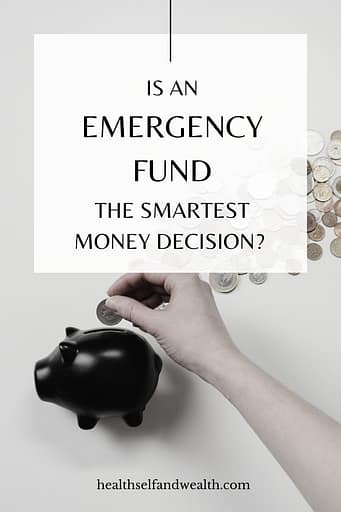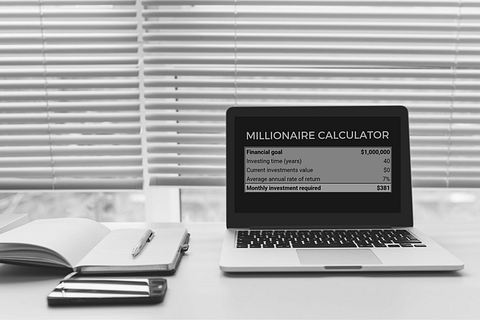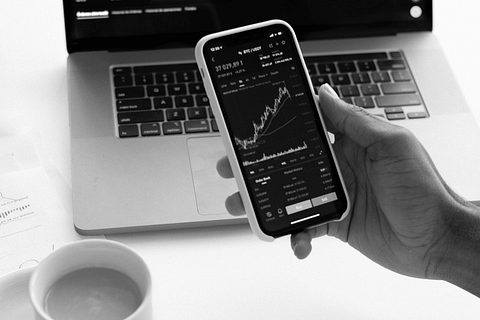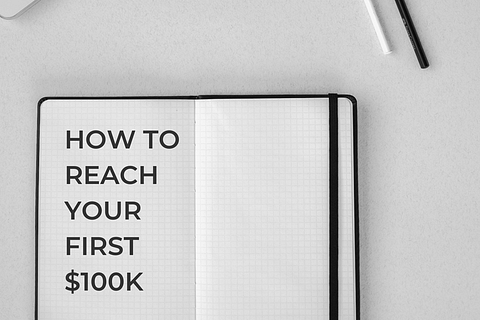
Is an emergency fund the smartest money decision in 2022? Yes – and I would say it’s the smartest money decision. If your financial situation is like a house, your emergency fund is the foundation. Even if you are doing everything else right money-wise, it all could come crashing down without a solid foundation (an emergency fund).
This post covers what an emergency fund is, 4 reasons why having an emergency fund is crucial, and how to create one.
- What is an emergency fund
- 4 reasons to have one
- How to create an emergency fund
*Please note: I am not a financial advisor. This is personal opinion, not financial advice. Every individual has a unique financial situation. Accordingly, always do your own research and due diligence before making any financial decisions.
What is an emergency fund
An emergency fund is an easily accessible sum of money. It creates a safety net in case of an emergency. Typically, people keep emergency funds in a savings account.
Everyone wants to know, how much do you need to keep in an emergency fund? This will vary greatly depending on your financial situation and risk tolerance. As a general guideline, financial experts typically recommend saving 3-6 months of expenses.*
*This requires an understanding of your average monthly spend. If you aren’t already tracking this, download the Personal Finance Planner to start today.
Ultimately, keep enough money on hand to confidently handle unexpected expenses without stress. This prevents you from making desperate decisions, like racking up high-interest debt.
There are other factors that can influence how much you may want to keep in an emergency fund, listed below.
| Lowers Amount | Factor | Increases Amount |
| No Dependents | Does anyone depend on you financially? | Dependents |
| 2+ | How many consistent, reliable sources of income do you have? | 1 |
| High risk tolerance | How would you describe your risk tolerance? | Low risk tolerance |
| My worst-case scenario isn’t bad – I have backup plans! | What is your worst-case scenario if your emergency fund runs out? | I would have to borrow money or withdraw from long-term investments |
Now that you know what an emergency fund is, let’s dive into 4 reasons why they are critical to financial wellbeing.
Losing primary income source
According to a 2021 BankRate study, the majority of millennials (57%!!) don’t have enough savings to cover 3 months of expenses. Beyond that, some millennials don’t have any savings at all.
On top of that, women are less likely than men to have a sufficient emergency fund. Ladies, let’s change that statistic! (If you’re reading this, you’re likely already leveling up your personal finance game, so good for you!)
This is a concerning situation, especially if you were to lose your primary source of income. What decisions would you have to make just to afford your basic needs like shelter and food?
Additionally, this creates a dependency on your income source for your wellbeing. It severely limits your options.
Covering unexpected expenses
Since most millennials don’t have enough savings, an unexpected expense could have negative consequences. For some, even an unpredictable, one-time expense of $444 could break the bank.
This is the #1, bare minimum reason to have an emergency fund. If you have a steady paycheck coming in yet, but couldn’t afford new tires in an emergency situation, yikes!*
*I only say this to emphasize the risks of this situation. If this describes your situation, systematic failures likely pushed you into this predicament. Even so, no one is coming to save you. You will have to decide to be your own hero and take action to reach a better financial state.
Preventing high-interest debt accumulation
Let’s say you find yourself in a situation with an unexpected expense without money in the bank to pay for it. Now what?
Maybe you have a good support system so you can call a parent or a friend and borrow money.
If not, you may feel trapped into putting the expense on a credit card. This generates high-interest debt, which quickly compounds the financial hole you’re in.
However, when you build an emergency fund, you can handle unexpected expenses stress-free.
Avoiding withdrawing from long-term investments
Maybe you don’t have any debt. Perhaps you’re a high earner and investor. You have a lot of your financial aspects figured out. You wonder, do you still need an emergency fund? YES!
It’s just as important for you to have an emergency fund as it is for everyone else. Let’s imagine a scenario where you lost your primary source of income.
Do you have enough savings on hand to support yourself until you find a new income source? If so, great – that’s exactly what emergency funds are for!
Consider saving more if you’d need high-interest debt or withdrawals from investments.*
*Small withdrawals from investments could be a backup option, depending on the investment account type. Some tax-advantaged accounts have withdrawal restrictions. Another thing to watch out for is having to sell investments while the market is down. That’s a guaranteed way to lose money in the stock market.
How to create an emergency fund
Emergency savings provide a safety net for income loss or unexpected expenses. They prevent desperate decisions like high-interest debt or early withdrawals from investments. Now that you know why you need one, here’s how to start one.
An emergency fund should be liquid, meaning it should be easily accessible. In other words, this money should be in a savings account.
If you want to get fancy with it, you could get a high-yield savings account. The interest rates are marginally better than traditional savings accounts.
If you don’t already have a savings account you can use for your emergency fund, open one. Choose a savings account without monthly fees and account minimums.
Determine how much you want to have in your savings account (at least 3 months of expenses). Then, decide how much you will save each month for your emergency fund.
Worrying about having enough money to pay the bills certainly adds unnecessary stress. So start building your emergency fund savings today so you can leave the stress behind.
Make a commitment to yourself
If you’re ready to start building your own emergency fund, there’s one thing you can do to ensure you’re on track to reach your savings goal: use a tracking system.
Whatever tracking system you choose should show your action (saving for an emergency fund) and show your overall progress towards your goal. This is important for 2 main reasons:
- It shows you if your actions are resulting in the progress you intended.
- Seeing your own progress is motivating and it keeps you inspired to reach your goals.
Once you’ve decided to track your goal, you’ve already proven to yourself that you are committed to reaching your goal.
If you want to set yourself up for success in saving for an emergency fund, check out the Personal Finance Planner. It’s a comprehensive Google Sheets spreadsheet that tracks any money decision you’d like and connects them to your outcomes.
Download your personal finance planner today to track your emergency fund savings.
Conclusion
The best financial decision you can make is having an emergency fund. Now you know what it is, why you need one, and how to start one.
How much will you choose to save in your emergency fund?
If you found this information helpful, subscribe to our email list for weekly personal finance tips.







[…] Learn more about why an emergency fund is the smartest money move here. […]
[…] Your emergency savings goal will depend on your unique financial situation. Read more about how to build an emergency fund here. […]
[…] If not, building an emergency fund is your first money goal. This will provide you with financial security throughout your financial journey. Read more on why this is the most important money decision and how to build one here. […]
[…] this case, that safety net is an emergency fund. It’s a savings account that can typically cover at least 3 months of your […]
[…] the checking account, it goes several places: investment accounts, savings account (AKA my emergency fund), and […]
[…] buffer is called an emergency fund. Having an emergency fund is the BEST money decision because it provides you with a greater sense of … Also if an unexpected expense occurs, like car maintenance, you won’t have to go into credit card […]